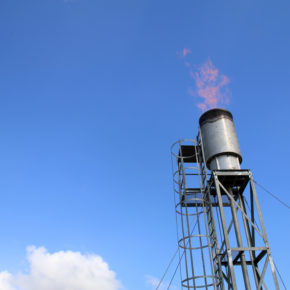
Posted on: 04. 30. 18
Methane emissions are a form of gasses that trap heat in the atmosphere. These greenhouse gases have negative impacts on climate change and in recent years, have been the subjects of reduction efforts in the atmosphere.
Methane is a gas that is emitted during the production process of:
- Natural Gas
- Oil
- Coal
Methane emissions are also sourced from livestock and agricultural locations. The productions of methane emissions in these situations occur when organic waste decays and releases these emissions into the atmosphere.
Although the different greenhouse gases impact the atmosphere in their own way, the impacts as a whole are negative, and that is why the oil and natural gas industry is taking the steps to reduce methane emissions while still producing quality products for public use.
Why Reduce Methane Emissions?
There are several reasons for production companies to want to reduce methane emissions. They range from concentration to length of stay in the atmosphere, to how they impact the atmosphere. According to the study, Inventory of U.S. Greenhouse Gas Emissions and Sinks, the impact of these emissions effects Global Warming Potential.
Reduction of methane emissions is all about improving the safety of production and environmental responsibility.
How Do They Impact the Atmosphere?
When examining the impact of methane emissions, the GWP must be calculated. This shows how long the gas is able to remain in the atmosphere and how strongly it sucks up energy. The higher the GWP, the more energy per pound is absorbed. This ultimately leads to more warming on Earth.
How Long Can Methane Emissions Remain in the Atmosphere?
Methane emissions can exist in the atmosphere from a few to thousands of years. The staggering amount of time that these emissions exist is one of the main reasons that methane emission reduction programs were put into place at production facilities.
How Are Methane Emissions Reduced?
Methane emissions are reduced through practices of responsible methane containment. Some of these practices are applied throughout the various stages of production. Management is not only mandatory by certain regulations but is also voluntary through actions like:
- Leak Detection
- Repair Programs
- Replacing High-Bleed Pneumatics with More Eco-Friendly Devices
Although steps to reduce methane emissions are being taken, scientists and production facilities are still trying to understand the actual impact that gases from the oil and gas industry have on the planet. Through further scientific studies, the oil and natural gas industry will be able to truly uncover how to effectively implement methane emissions reduction through the use of environmentally friendly practices in production.
Pro-Gas LLC Offers Equipment that Promotes Emissions Reduction
If you run a business in the oil and natural gas production industry, then you probably are already concerned with taking the steps towards methane emissions reduction. In order to practice what you preach, you will want to work with equipment that will help meet your quality goals. Pro-Gas LLC is the best provider of quality, eco-friendly equipment for facilities. Get in touch with us today to find out more about our products and services.


